
agentops
Python SDK for AI agent monitoring, LLM cost tracking, benchmarking, and more. Integrates with most LLMs and agent frameworks including OpenAI Agents SDK, CrewAI, Langchain, Autogen, AG2, and CamelAI
Stars: 4124
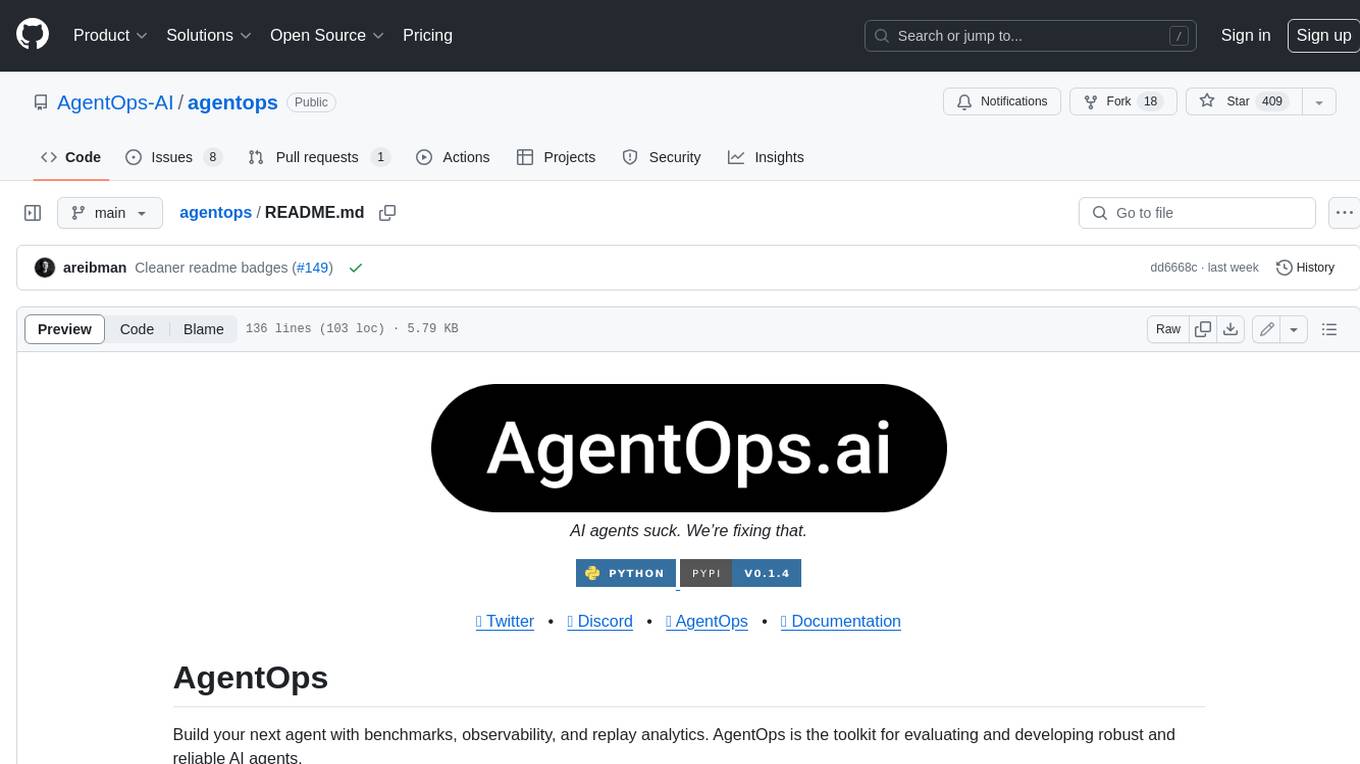
AgentOps is a toolkit for evaluating and developing robust and reliable AI agents. It provides benchmarks, observability, and replay analytics to help developers build better agents. AgentOps is open beta and can be signed up for here. Key features of AgentOps include: - Session replays in 3 lines of code: Initialize the AgentOps client and automatically get analytics on every LLM call. - Time travel debugging: (coming soon!) - Agent Arena: (coming soon!) - Callback handlers: AgentOps works seamlessly with applications built using Langchain and LlamaIndex.
README:
AgentOps helps developers build, evaluate, and monitor AI agents. From prototype to production.
| 📊 Replay Analytics and Debugging | Step-by-step agent execution graphs |
| 💸 LLM Cost Management | Track spend with LLM foundation model providers |
| 🧪 Agent Benchmarking | Test your agents against 1,000+ evals |
| 🔐 Compliance and Security | Detect common prompt injection and data exfiltration exploits |
| 🤝 Framework Integrations | Native Integrations with CrewAI, AG2 (AutoGen), Camel AI, & LangChain |
pip install agentopsInitialize the AgentOps client and automatically get analytics on all your LLM calls.
import agentops
# Beginning of your program (i.e. main.py, __init__.py)
agentops.init( < INSERT YOUR API KEY HERE >)
...
# End of program
agentops.end_session('Success')All your sessions can be viewed on the AgentOps dashboard
Add powerful observability to your agents, tools, and functions with as little code as possible: one line at a time.
Refer to our documentation
# Create a session span (root for all other spans)
from agentops.sdk.decorators import session
@session
def my_workflow():
# Your session code here
return result# Create an agent span for tracking agent operations
from agentops.sdk.decorators import agent
@agent
class MyAgent:
def __init__(self, name):
self.name = name
# Agent methods here# Create operation/task spans for tracking specific operations
from agentops.sdk.decorators import operation, task
@operation # or @task
def process_data(data):
# Process the data
return result# Create workflow spans for tracking multi-operation workflows
from agentops.sdk.decorators import workflow
@workflow
def my_workflow(data):
# Workflow implementation
return result# Nest decorators for proper span hierarchy
from agentops.sdk.decorators import session, agent, operation
@agent
class MyAgent:
@operation
def nested_operation(self, message):
return f"Processed: {message}"
@operation
def main_operation(self):
result = self.nested_operation("test message")
return result
@session
def my_session():
agent = MyAgent()
return agent.main_operation()All decorators support:
- Input/Output Recording
- Exception Handling
- Async/await functions
- Generator functions
- Custom attributes and names
Build multi-agent systems with tools, handoffs, and guardrails. AgentOps natively integrates with OpenAI Agents.
pip install openai-agentsBuild Crew agents with observability in just 2 lines of code. Simply set an AGENTOPS_API_KEY in your environment, and your crews will get automatic monitoring on the AgentOps dashboard.
pip install 'crewai[agentops]'With only two lines of code, add full observability and monitoring to AG2 (formerly AutoGen) agents. Set an AGENTOPS_API_KEY in your environment and call agentops.init()
Track and analyze CAMEL agents with full observability. Set an AGENTOPS_API_KEY in your environment and initialize AgentOps to get started.
- Camel AI - Advanced agent communication framework
- AgentOps integration example
- Official Camel AI documentation
Installation
pip install "camel-ai[all]==0.2.11"
pip install agentopsimport os
import agentops
from camel.agents import ChatAgent
from camel.messages import BaseMessage
from camel.models import ModelFactory
from camel.types import ModelPlatformType, ModelType
# Initialize AgentOps
agentops.init(os.getenv("AGENTOPS_API_KEY"), tags=["CAMEL Example"])
# Import toolkits after AgentOps init for tracking
from camel.toolkits import SearchToolkit
# Set up the agent with search tools
sys_msg = BaseMessage.make_assistant_message(
role_name='Tools calling operator',
content='You are a helpful assistant'
)
# Configure tools and model
tools = [*SearchToolkit().get_tools()]
model = ModelFactory.create(
model_platform=ModelPlatformType.OPENAI,
model_type=ModelType.GPT_4O_MINI,
)
# Create and run the agent
camel_agent = ChatAgent(
system_message=sys_msg,
model=model,
tools=tools,
)
response = camel_agent.step("What is AgentOps?")
print(response)
agentops.end_session("Success")Check out our Camel integration guide for more examples including multi-agent scenarios.
AgentOps works seamlessly with applications built using Langchain. To use the handler, install Langchain as an optional dependency:
Installation
pip install agentops[langchain]To use the handler, import and set
import os
from langchain.chat_models import ChatOpenAI
from langchain.agents import initialize_agent, AgentType
from agentops.partners.langchain_callback_handler import LangchainCallbackHandler
AGENTOPS_API_KEY = os.environ['AGENTOPS_API_KEY']
handler = LangchainCallbackHandler(api_key=AGENTOPS_API_KEY, tags=['Langchain Example'])
llm = ChatOpenAI(openai_api_key=OPENAI_API_KEY,
callbacks=[handler],
model='gpt-3.5-turbo')
agent = initialize_agent(tools,
llm,
agent=AgentType.CHAT_ZERO_SHOT_REACT_DESCRIPTION,
verbose=True,
callbacks=[handler], # You must pass in a callback handler to record your agent
handle_parsing_errors=True)Check out the Langchain Examples Notebook for more details including Async handlers.
First class support for Cohere(>=5.4.0). This is a living integration, should you need any added functionality please message us on Discord!
Installation
pip install cohereimport cohere
import agentops
# Beginning of program's code (i.e. main.py, __init__.py)
agentops.init(<INSERT YOUR API KEY HERE>)
co = cohere.Client()
chat = co.chat(
message="Is it pronounced ceaux-hear or co-hehray?"
)
print(chat)
agentops.end_session('Success')import cohere
import agentops
# Beginning of program's code (i.e. main.py, __init__.py)
agentops.init(<INSERT YOUR API KEY HERE>)
co = cohere.Client()
stream = co.chat_stream(
message="Write me a haiku about the synergies between Cohere and AgentOps"
)
for event in stream:
if event.event_type == "text-generation":
print(event.text, end='')
agentops.end_session('Success')Track agents built with the Anthropic Python SDK (>=0.32.0).
Installation
pip install anthropicimport anthropic
import agentops
# Beginning of program's code (i.e. main.py, __init__.py)
agentops.init(<INSERT YOUR API KEY HERE>)
client = anthropic.Anthropic(
# This is the default and can be omitted
api_key=os.environ.get("ANTHROPIC_API_KEY"),
)
message = client.messages.create(
max_tokens=1024,
messages=[
{
"role": "user",
"content": "Tell me a cool fact about AgentOps",
}
],
model="claude-3-opus-20240229",
)
print(message.content)
agentops.end_session('Success')Streaming
import anthropic
import agentops
# Beginning of program's code (i.e. main.py, __init__.py)
agentops.init(<INSERT YOUR API KEY HERE>)
client = anthropic.Anthropic(
# This is the default and can be omitted
api_key=os.environ.get("ANTHROPIC_API_KEY"),
)
stream = client.messages.create(
max_tokens=1024,
model="claude-3-opus-20240229",
messages=[
{
"role": "user",
"content": "Tell me something cool about streaming agents",
}
],
stream=True,
)
response = ""
for event in stream:
if event.type == "content_block_delta":
response += event.delta.text
elif event.type == "message_stop":
print("\n")
print(response)
print("\n")Async
import asyncio
from anthropic import AsyncAnthropic
client = AsyncAnthropic(
# This is the default and can be omitted
api_key=os.environ.get("ANTHROPIC_API_KEY"),
)
async def main() -> None:
message = await client.messages.create(
max_tokens=1024,
messages=[
{
"role": "user",
"content": "Tell me something interesting about async agents",
}
],
model="claude-3-opus-20240229",
)
print(message.content)
await main()Track agents built with the Mistral Python SDK (>=0.32.0).
Installation
pip install mistralaiSync
from mistralai import Mistral
import agentops
# Beginning of program's code (i.e. main.py, __init__.py)
agentops.init(<INSERT YOUR API KEY HERE>)
client = Mistral(
# This is the default and can be omitted
api_key=os.environ.get("MISTRAL_API_KEY"),
)
message = client.chat.complete(
messages=[
{
"role": "user",
"content": "Tell me a cool fact about AgentOps",
}
],
model="open-mistral-nemo",
)
print(message.choices[0].message.content)
agentops.end_session('Success')Streaming
from mistralai import Mistral
import agentops
# Beginning of program's code (i.e. main.py, __init__.py)
agentops.init(<INSERT YOUR API KEY HERE>)
client = Mistral(
# This is the default and can be omitted
api_key=os.environ.get("MISTRAL_API_KEY"),
)
message = client.chat.stream(
messages=[
{
"role": "user",
"content": "Tell me something cool about streaming agents",
}
],
model="open-mistral-nemo",
)
response = ""
for event in message:
if event.data.choices[0].finish_reason == "stop":
print("\n")
print(response)
print("\n")
else:
response += event.text
agentops.end_session('Success')Async
import asyncio
from mistralai import Mistral
client = Mistral(
# This is the default and can be omitted
api_key=os.environ.get("MISTRAL_API_KEY"),
)
async def main() -> None:
message = await client.chat.complete_async(
messages=[
{
"role": "user",
"content": "Tell me something interesting about async agents",
}
],
model="open-mistral-nemo",
)
print(message.choices[0].message.content)
await main()Async Streaming
import asyncio
from mistralai import Mistral
client = Mistral(
# This is the default and can be omitted
api_key=os.environ.get("MISTRAL_API_KEY"),
)
async def main() -> None:
message = await client.chat.stream_async(
messages=[
{
"role": "user",
"content": "Tell me something interesting about async streaming agents",
}
],
model="open-mistral-nemo",
)
response = ""
async for event in message:
if event.data.choices[0].finish_reason == "stop":
print("\n")
print(response)
print("\n")
else:
response += event.text
await main()Track agents built with the CamelAI Python SDK (>=0.32.0).
Installation
pip install camel-ai[all]
pip install agentops#Import Dependencies
import agentops
import os
from getpass import getpass
from dotenv import load_dotenv
#Set Keys
load_dotenv()
openai_api_key = os.getenv("OPENAI_API_KEY") or "<your openai key here>"
agentops_api_key = os.getenv("AGENTOPS_API_KEY") or "<your agentops key here>"
You can find usage examples here!.
AgentOps provides support for LiteLLM(>=1.3.1), allowing you to call 100+ LLMs using the same Input/Output Format.
Installation
pip install litellm# Do not use LiteLLM like this
# from litellm import completion
# ...
# response = completion(model="claude-3", messages=messages)
# Use LiteLLM like this
import litellm
...
response = litellm.completion(model="claude-3", messages=messages)
# or
response = await litellm.acompletion(model="claude-3", messages=messages)AgentOps works seamlessly with applications built using LlamaIndex, a framework for building context-augmented generative AI applications with LLMs.
Installation
pip install llama-index-instrumentation-agentopsTo use the handler, import and set
from llama_index.core import set_global_handler
# NOTE: Feel free to set your AgentOps environment variables (e.g., 'AGENTOPS_API_KEY')
# as outlined in the AgentOps documentation, or pass the equivalent keyword arguments
# anticipated by AgentOps' AOClient as **eval_params in set_global_handler.
set_global_handler("agentops")Check out the LlamaIndex docs for more details.
AgentOps provides support for Llama Stack Python Client(>=0.0.53), allowing you to monitor your Agentic applications.
Track and analyze SwarmZero agents with full observability. Set an AGENTOPS_API_KEY in your environment and initialize AgentOps to get started.
- SwarmZero - Advanced multi-agent framework
- AgentOps integration example
- SwarmZero AI integration example
- SwarmZero AI - AgentOps documentation
- Official SwarmZero Python SDK
Installation
pip install swarmzero
pip install agentopsfrom dotenv import load_dotenv
load_dotenv()
import agentops
agentops.init(<INSERT YOUR API KEY HERE>)
from swarmzero import Agent, Swarm
# ...(coming soon!)
| Platform | Dashboard | Evals |
|---|---|---|
| ✅ Python SDK | ✅ Multi-session and Cross-session metrics | ✅ Custom eval metrics |
| 🚧 Evaluation builder API | ✅ Custom event tag tracking | 🔜 Agent scorecards |
| ✅ Javascript/Typescript SDK | ✅ Session replays | 🔜 Evaluation playground + leaderboard |
| Performance testing | Environments | LLM Testing | Reasoning and execution testing |
|---|---|---|---|
| ✅ Event latency analysis | 🔜 Non-stationary environment testing | 🔜 LLM non-deterministic function detection | 🚧 Infinite loops and recursive thought detection |
| ✅ Agent workflow execution pricing | 🔜 Multi-modal environments | 🚧 Token limit overflow flags | 🔜 Faulty reasoning detection |
| 🚧 Success validators (external) | 🔜 Execution containers | 🔜 Context limit overflow flags | 🔜 Generative code validators |
| 🔜 Agent controllers/skill tests | ✅ Honeypot and prompt injection detection (PromptArmor) | 🔜 API bill tracking | 🔜 Error breakpoint analysis |
| 🔜 Information context constraint testing | 🔜 Anti-agent roadblocks (i.e. Captchas) | 🔜 CI/CD integration checks | |
| 🔜 Regression testing | 🔜 Multi-agent framework visualization |
Without the right tools, AI agents are slow, expensive, and unreliable. Our mission is to bring your agent from prototype to production. Here's why AgentOps stands out:
- Comprehensive Observability: Track your AI agents' performance, user interactions, and API usage.
- Real-Time Monitoring: Get instant insights with session replays, metrics, and live monitoring tools.
- Cost Control: Monitor and manage your spend on LLM and API calls.
- Failure Detection: Quickly identify and respond to agent failures and multi-agent interaction issues.
- Tool Usage Statistics: Understand how your agents utilize external tools with detailed analytics.
- Session-Wide Metrics: Gain a holistic view of your agents' sessions with comprehensive statistics.
AgentOps is designed to make agent observability, testing, and monitoring easy.
Check out our growth in the community:
| Repository | Stars |
|---|---|
|
|
42787 |
|
|
34446 |
|
|
18287 |
|
|
5166 |
|
|
5050 |
|
|
4713 |
|
|
2723 |
|
|
2007 |
|
|
272 |
|
|
195 |
|
|
134 |
|
|
55 |
|
|
47 |
|
|
27 |
|
|
19 |
|
|
14 |
|
|
13 |
Generated using github-dependents-info, by Nicolas Vuillamy
For Tasks:
Click tags to check more tools for each tasksFor Jobs:
Alternative AI tools for agentops
Similar Open Source Tools

agentops
AgentOps is a toolkit for evaluating and developing robust and reliable AI agents. It provides benchmarks, observability, and replay analytics to help developers build better agents. AgentOps is open beta and can be signed up for here. Key features of AgentOps include: - Session replays in 3 lines of code: Initialize the AgentOps client and automatically get analytics on every LLM call. - Time travel debugging: (coming soon!) - Agent Arena: (coming soon!) - Callback handlers: AgentOps works seamlessly with applications built using Langchain and LlamaIndex.
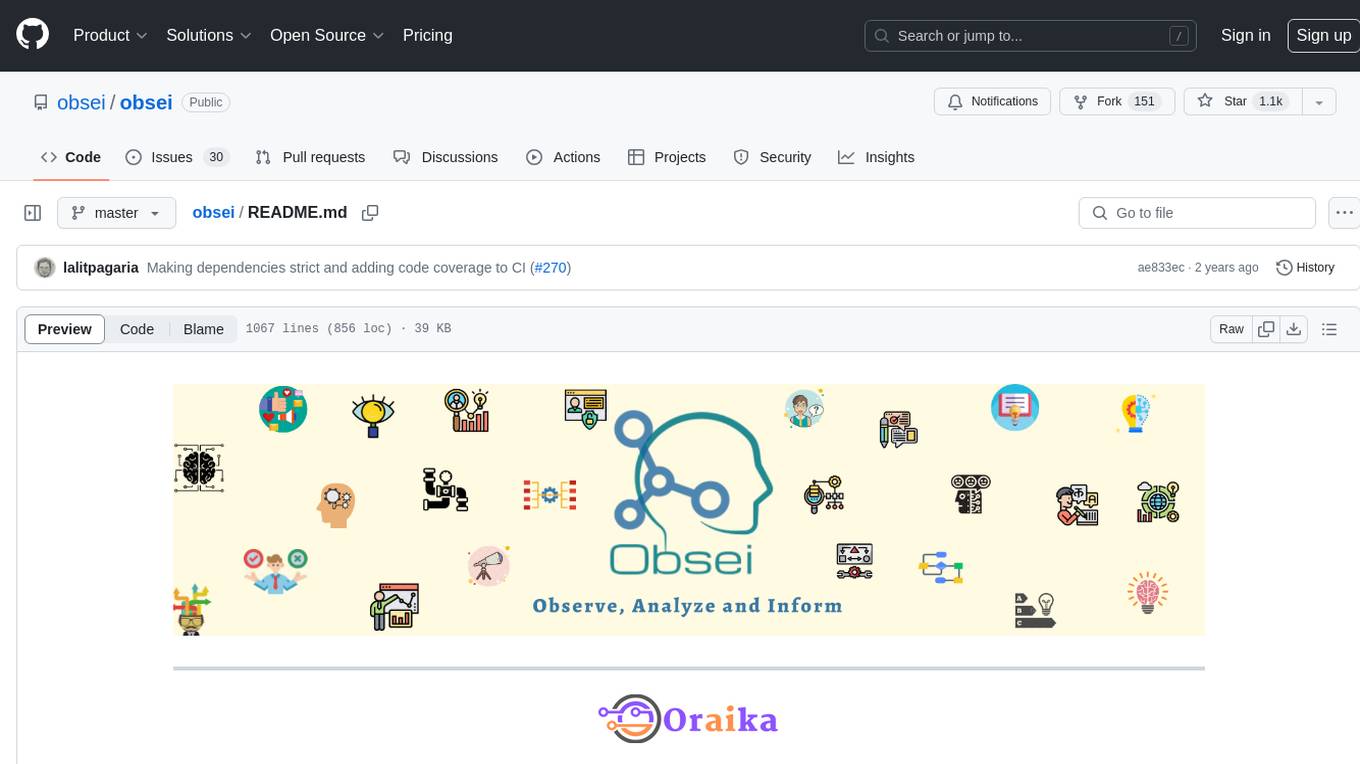
obsei
Obsei is an open-source, low-code, AI powered automation tool that consists of an Observer to collect unstructured data from various sources, an Analyzer to analyze the collected data with various AI tasks, and an Informer to send analyzed data to various destinations. The tool is suitable for scheduled jobs or serverless applications as all Observers can store their state in databases. Obsei is still in alpha stage, so caution is advised when using it in production. The tool can be used for social listening, alerting/notification, automatic customer issue creation, extraction of deeper insights from feedbacks, market research, dataset creation for various AI tasks, and more based on creativity.
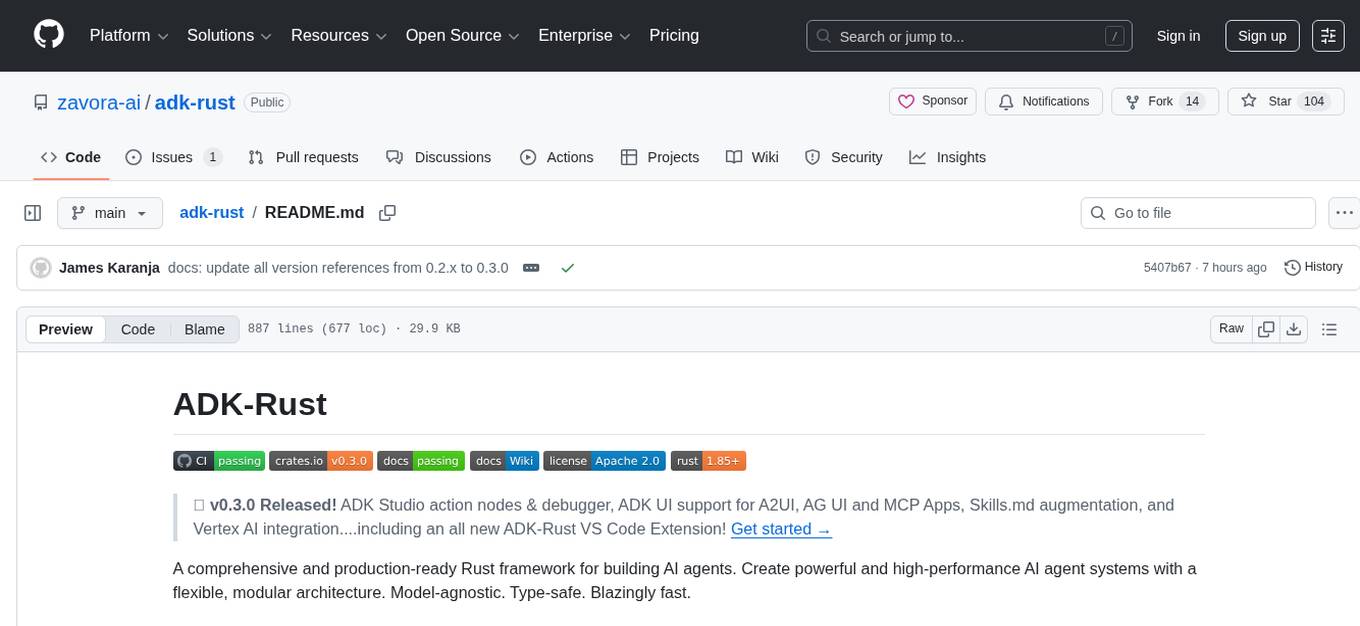
adk-rust
ADK-Rust is a comprehensive and production-ready Rust framework for building AI agents. It features type-safe agent abstractions with async execution and event streaming, multiple agent types including LLM agents, workflow agents, and custom agents, realtime voice agents with bidirectional audio streaming, a tool ecosystem with function tools, Google Search, and MCP integration, production features like session management, artifact storage, memory systems, and REST/A2A APIs, and a developer-friendly experience with interactive CLI, working examples, and comprehensive documentation. The framework follows a clean layered architecture and is production-ready and actively maintained.
pixeltable
Pixeltable is a Python library designed for ML Engineers and Data Scientists to focus on exploration, modeling, and app development without the need to handle data plumbing. It provides a declarative interface for working with text, images, embeddings, and video, enabling users to store, transform, index, and iterate on data within a single table interface. Pixeltable is persistent, acting as a database unlike in-memory Python libraries such as Pandas. It offers features like data storage and versioning, combined data and model lineage, indexing, orchestration of multimodal workloads, incremental updates, and automatic production-ready code generation. The tool emphasizes transparency, reproducibility, cost-saving through incremental data changes, and seamless integration with existing Python code and libraries.
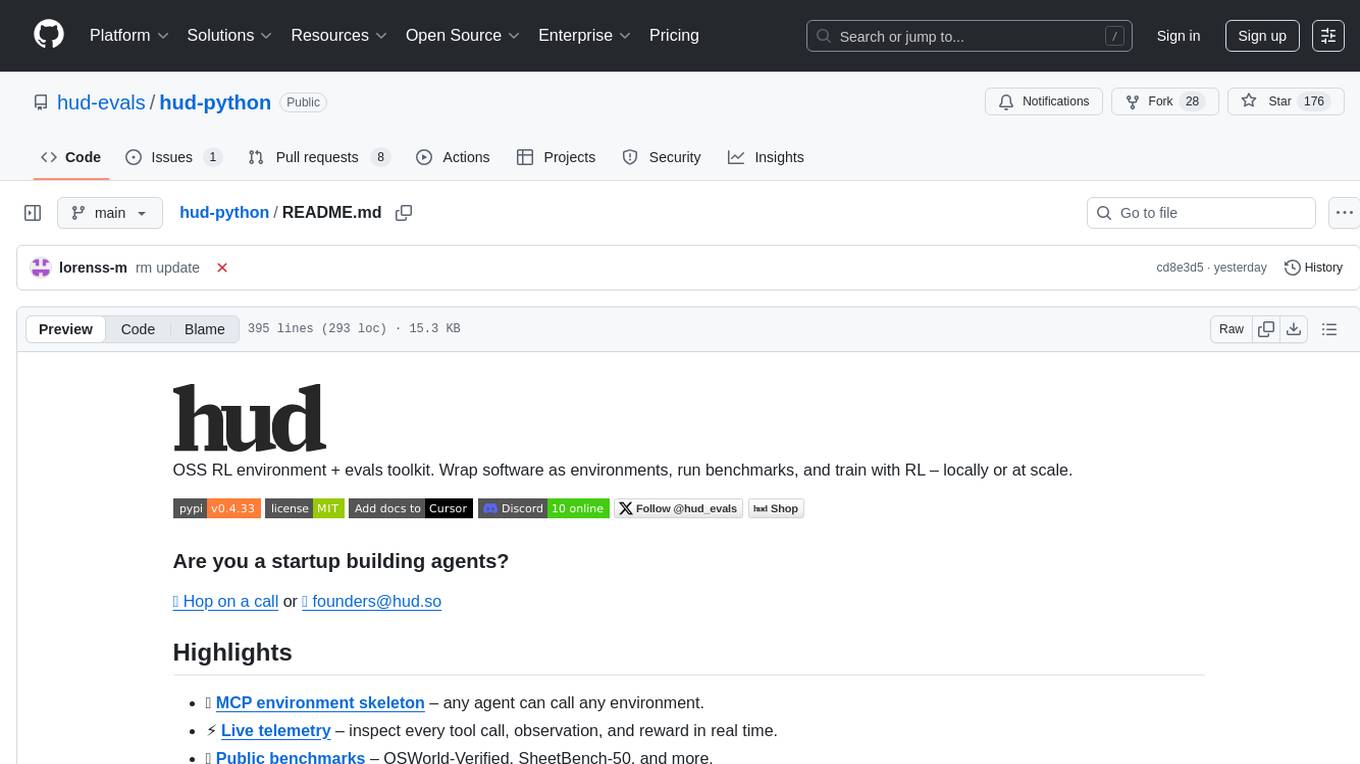
hud-python
hud-python is a Python library for creating interactive heads-up displays (HUDs) in video games. It provides a simple and flexible way to overlay information on the screen, such as player health, score, and notifications. The library is designed to be easy to use and customizable, allowing game developers to enhance the user experience by adding dynamic elements to their games. With hud-python, developers can create engaging HUDs that improve gameplay and provide important feedback to players.
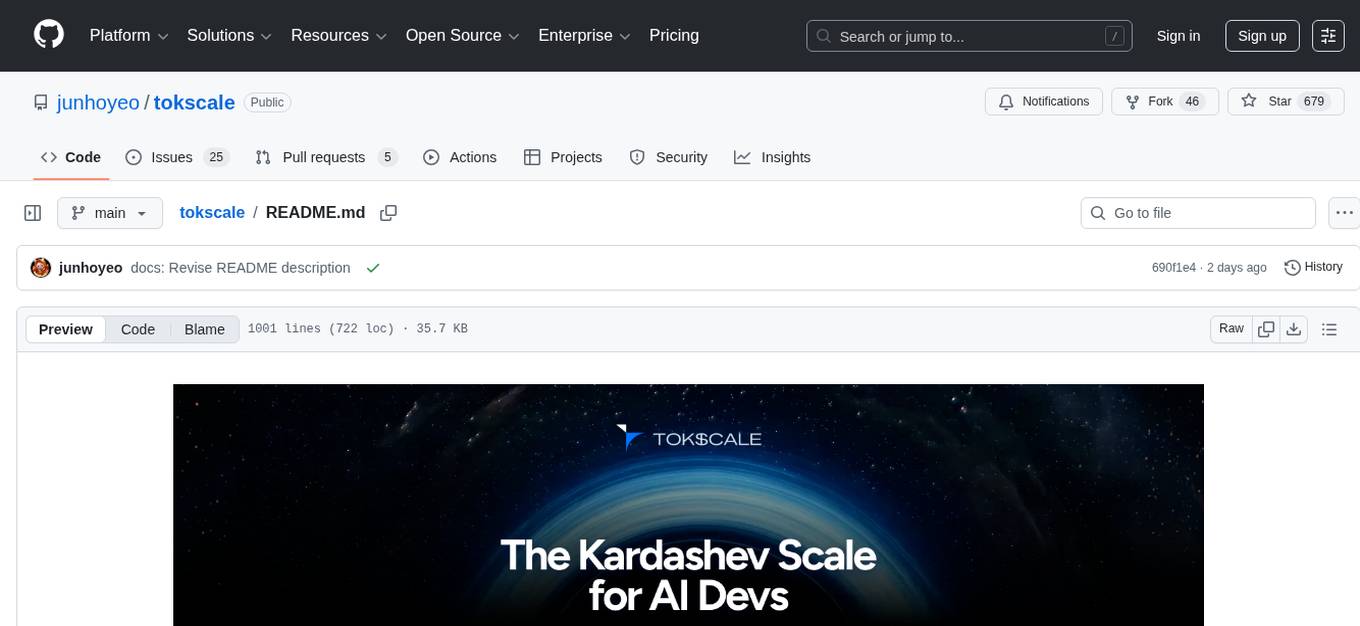
tokscale
Tokscale is a high-performance CLI tool and visualization dashboard for tracking token usage and costs across multiple AI coding agents. It helps monitor and analyze token consumption from various AI coding tools, providing real-time pricing calculations using LiteLLM's pricing data. Inspired by the Kardashev scale, Tokscale measures token consumption as users scale the ranks of AI-augmented development. It offers interactive TUI mode, multi-platform support, real-time pricing, detailed breakdowns, web visualization, flexible filtering, and social platform features.
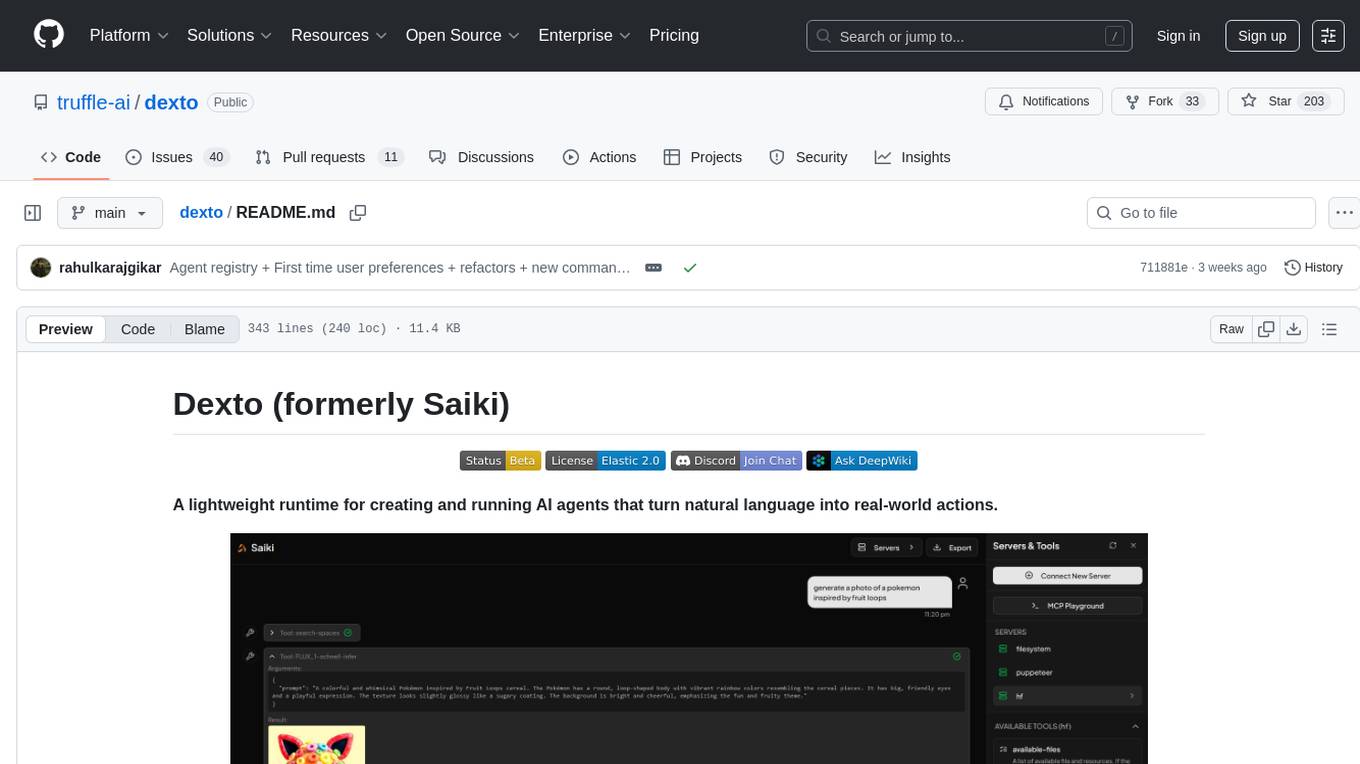
dexto
Dexto is a lightweight runtime for creating and running AI agents that turn natural language into real-world actions. It serves as the missing intelligence layer for building AI applications, standalone chatbots, or as the reasoning engine inside larger products. Dexto features a powerful CLI and Web UI for running AI agents, supports multiple interfaces, allows hot-swapping of LLMs from various providers, connects to remote tool servers via the Model Context Protocol, is config-driven with version-controlled YAML, offers production-ready core features, extensibility for custom services, and enables multi-agent collaboration via MCP and A2A.
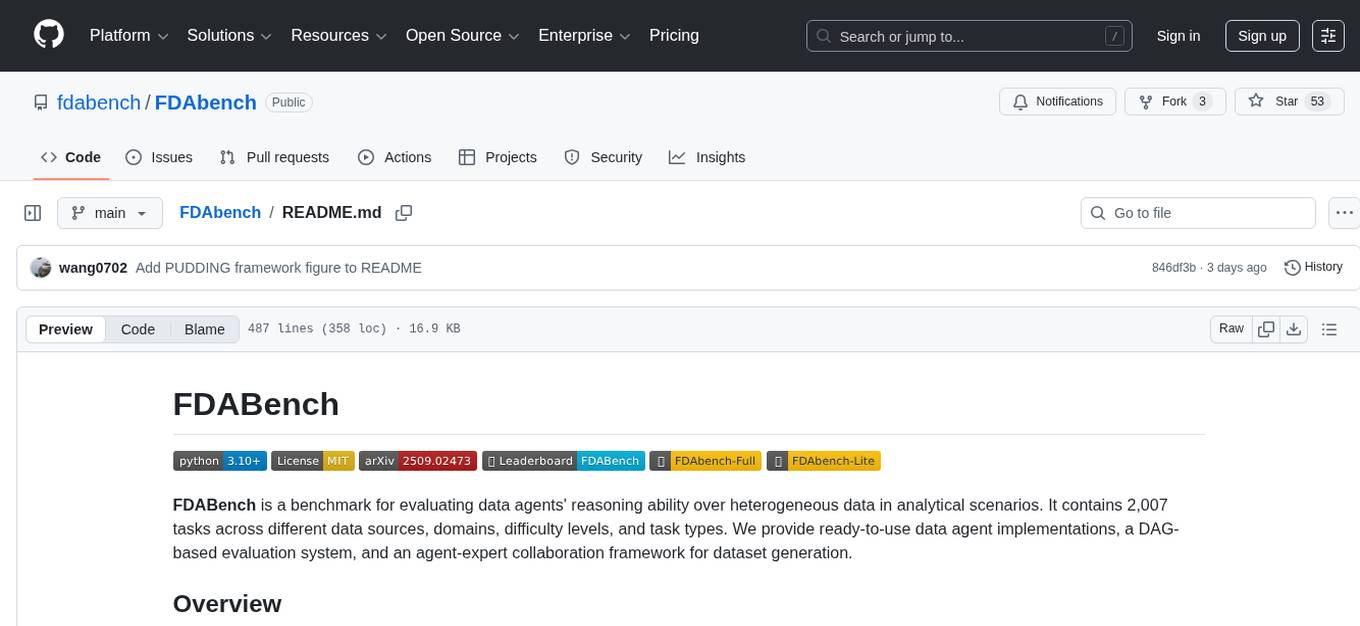
FDAbench
FDABench is a benchmark tool designed for evaluating data agents' reasoning ability over heterogeneous data in analytical scenarios. It offers 2,007 tasks across various data sources, domains, difficulty levels, and task types. The tool provides ready-to-use data agent implementations, a DAG-based evaluation system, and a framework for agent-expert collaboration in dataset generation. Key features include data agent implementations, comprehensive evaluation metrics, multi-database support, different task types, extensible framework for custom agent integration, and cost tracking. Users can set up the environment using Python 3.10+ on Linux, macOS, or Windows. FDABench can be installed with a one-command setup or manually. The tool supports API configuration for LLM access and offers quick start guides for database download, dataset loading, and running examples. It also includes features like dataset generation using the PUDDING framework, custom agent integration, evaluation metrics like accuracy and rubric score, and a directory structure for easy navigation.
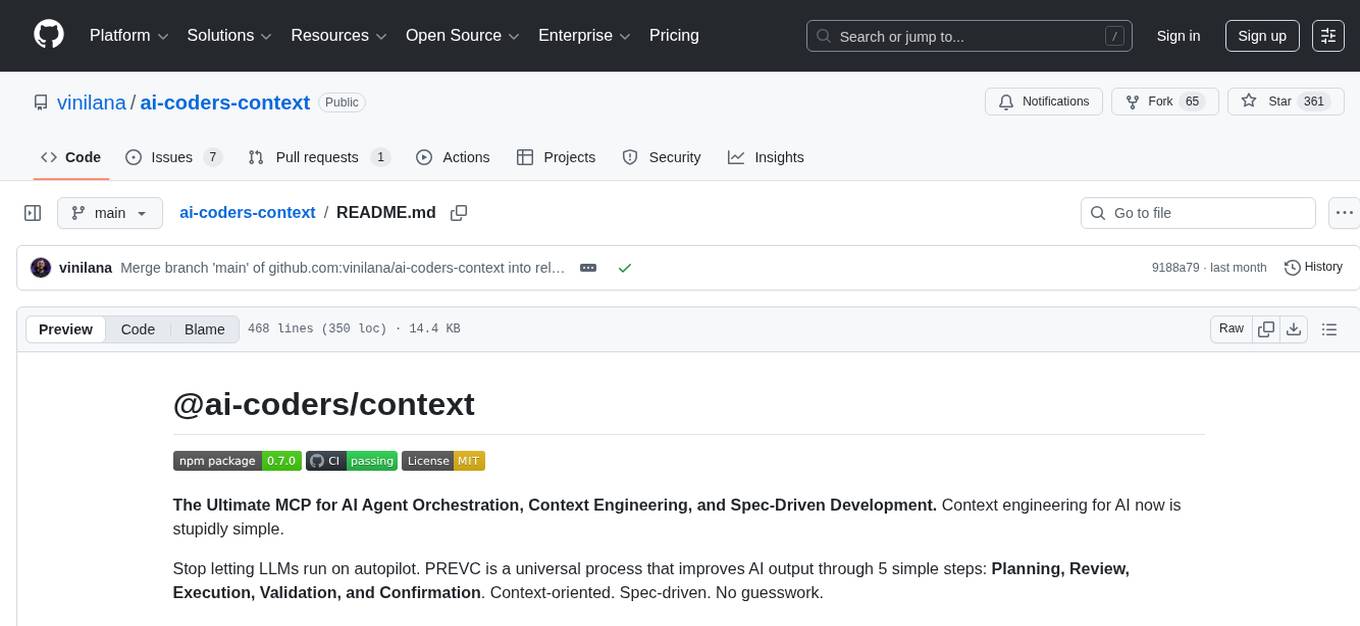
ai-coders-context
The @ai-coders/context repository provides the Ultimate MCP for AI Agent Orchestration, Context Engineering, and Spec-Driven Development. It simplifies context engineering for AI by offering a universal process called PREVC, which consists of Planning, Review, Execution, Validation, and Confirmation steps. The tool aims to address the problem of context fragmentation by introducing a single `.context/` directory that works universally across different tools. It enables users to create structured documentation, generate agent playbooks, manage workflows, provide on-demand expertise, and sync across various AI tools. The tool follows a structured, spec-driven development approach to improve AI output quality and ensure reproducible results across projects.
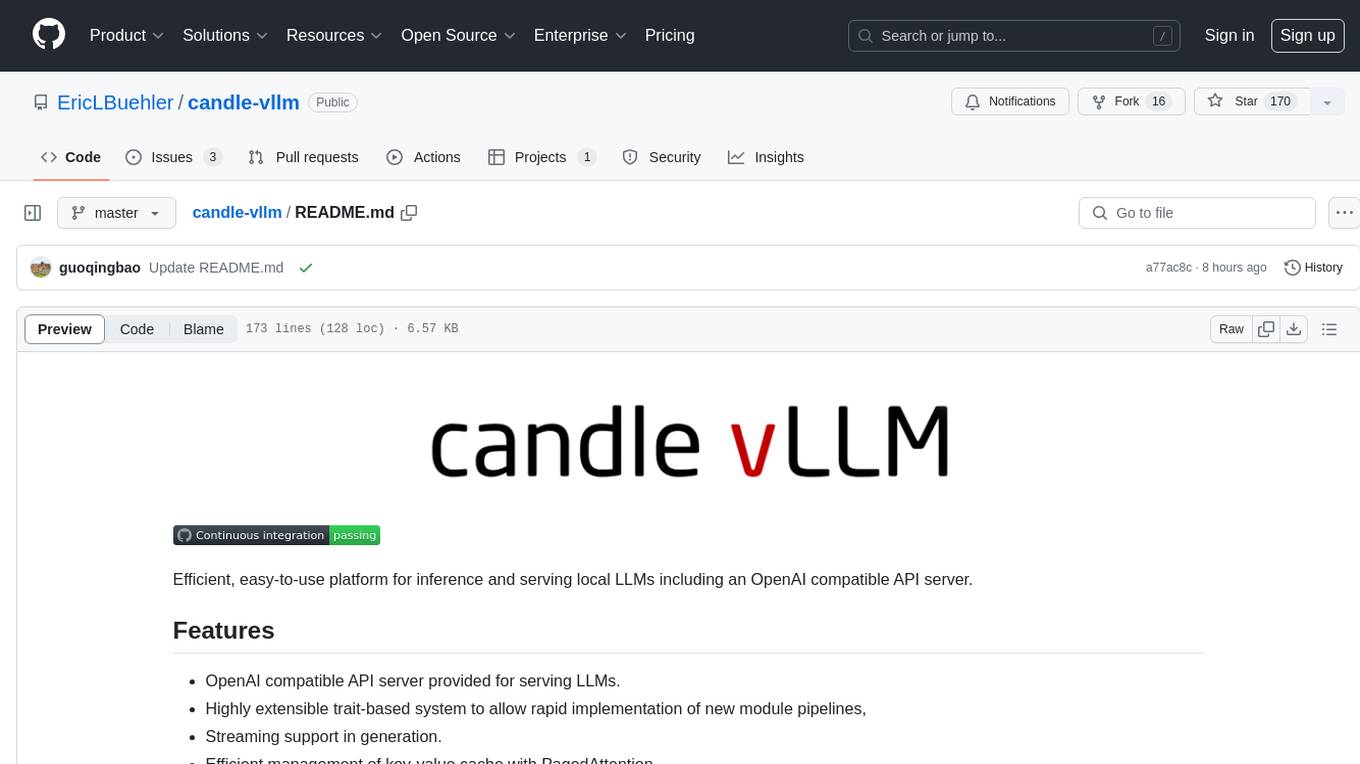
candle-vllm
Candle-vllm is an efficient and easy-to-use platform designed for inference and serving local LLMs, featuring an OpenAI compatible API server. It offers a highly extensible trait-based system for rapid implementation of new module pipelines, streaming support in generation, efficient management of key-value cache with PagedAttention, and continuous batching. The tool supports chat serving for various models and provides a seamless experience for users to interact with LLMs through different interfaces.
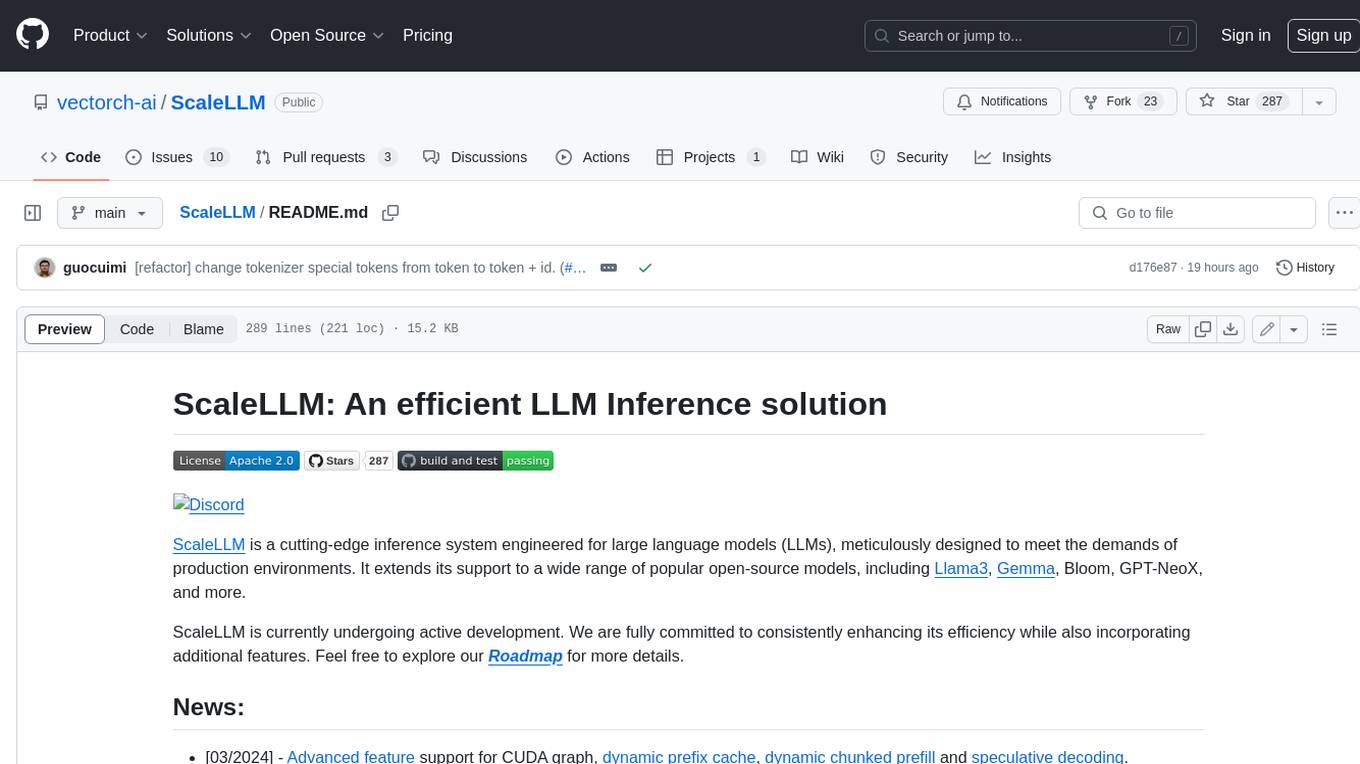
ScaleLLM
ScaleLLM is a cutting-edge inference system engineered for large language models (LLMs), meticulously designed to meet the demands of production environments. It extends its support to a wide range of popular open-source models, including Llama3, Gemma, Bloom, GPT-NeoX, and more. ScaleLLM is currently undergoing active development. We are fully committed to consistently enhancing its efficiency while also incorporating additional features. Feel free to explore our **_Roadmap_** for more details. ## Key Features * High Efficiency: Excels in high-performance LLM inference, leveraging state-of-the-art techniques and technologies like Flash Attention, Paged Attention, Continuous batching, and more. * Tensor Parallelism: Utilizes tensor parallelism for efficient model execution. * OpenAI-compatible API: An efficient golang rest api server that compatible with OpenAI. * Huggingface models: Seamless integration with most popular HF models, supporting safetensors. * Customizable: Offers flexibility for customization to meet your specific needs, and provides an easy way to add new models. * Production Ready: Engineered with production environments in mind, ScaleLLM is equipped with robust system monitoring and management features to ensure a seamless deployment experience.
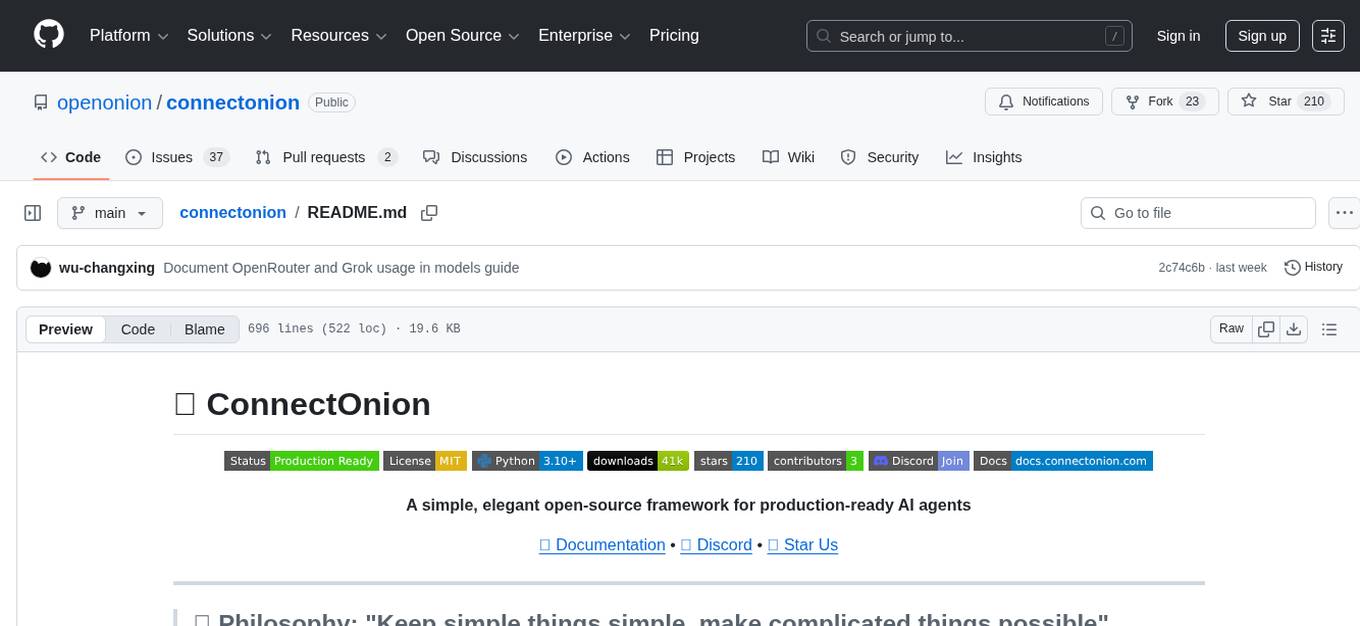
connectonion
ConnectOnion is a simple, elegant open-source framework for production-ready AI agents. It provides a platform for creating and using AI agents with a focus on simplicity and efficiency. The framework allows users to easily add tools, debug agents, make them production-ready, and enable multi-agent capabilities. ConnectOnion offers a simple API, is production-ready with battle-tested models, and is open-source under the MIT license. It features a plugin system for adding reflection and reasoning capabilities, interactive debugging for easy troubleshooting, and no boilerplate code for seamless scaling from prototypes to production systems.
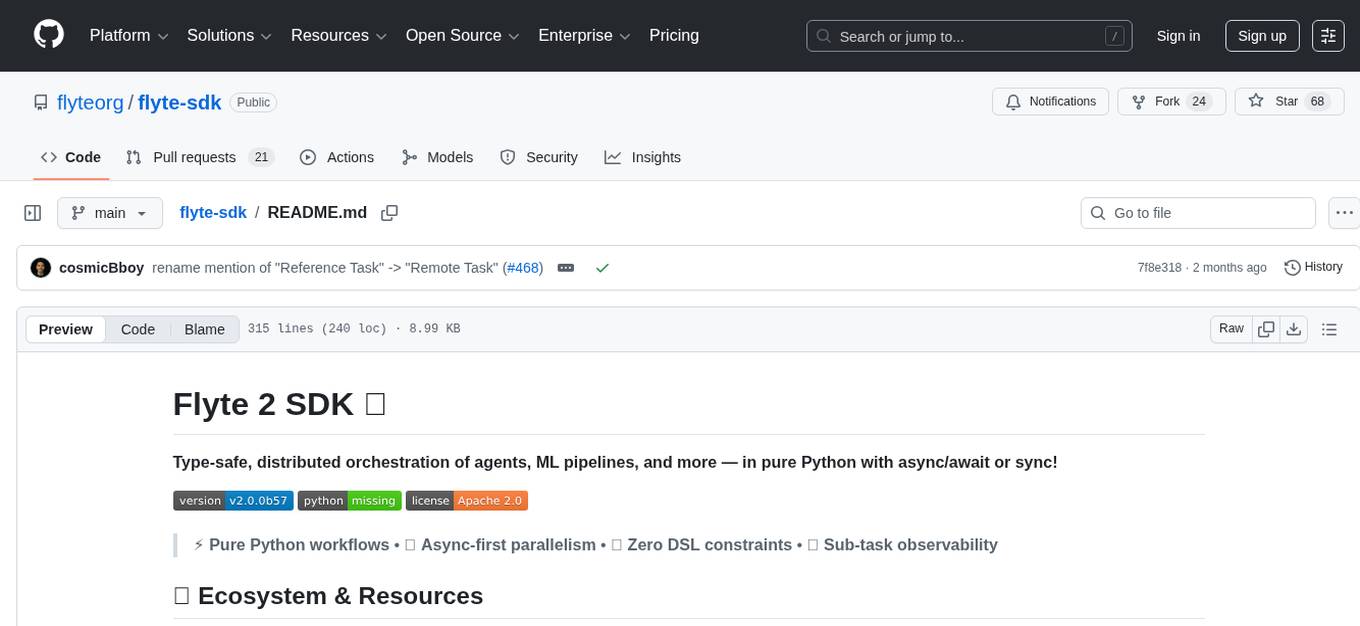
flyte-sdk
Flyte 2 SDK is a pure Python tool for type-safe, distributed orchestration of agents, ML pipelines, and more. It allows users to write data pipelines, ML training jobs, and distributed compute in Python without any DSL constraints. With features like async-first parallelism and fine-grained observability, Flyte 2 offers a seamless workflow experience. Users can leverage core concepts like TaskEnvironments for container configuration, pure Python workflows for flexibility, and async parallelism for distributed execution. Advanced features include sub-task observability with tracing and remote task execution. The tool also provides native Jupyter integration for running and monitoring workflows directly from notebooks. Configuration and deployment are made easy with configuration files and commands for deploying and running workflows. Flyte 2 is licensed under the Apache 2.0 License.
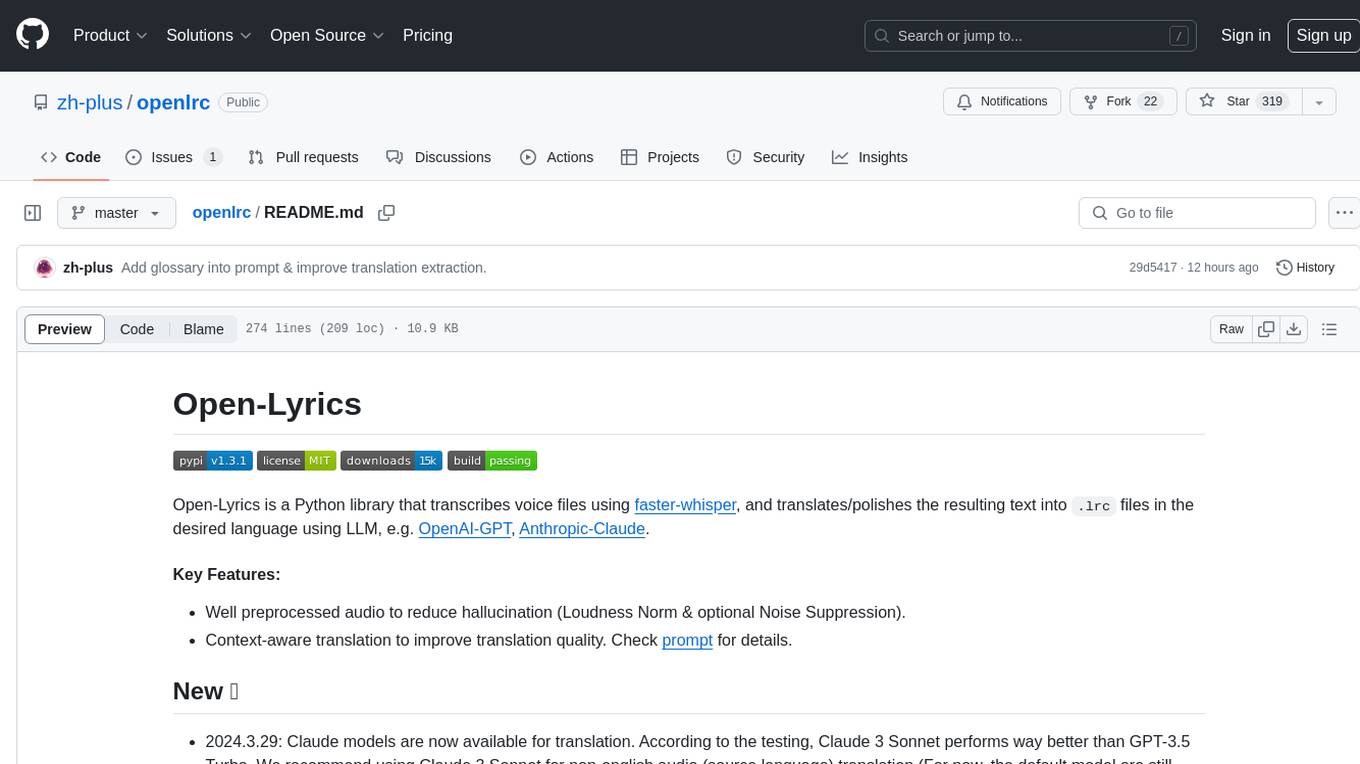
openlrc
Open-Lyrics is a Python library that transcribes voice files using faster-whisper and translates/polishes the resulting text into `.lrc` files in the desired language using LLM, e.g. OpenAI-GPT, Anthropic-Claude. It offers well preprocessed audio to reduce hallucination and context-aware translation to improve translation quality. Users can install the library from PyPI or GitHub and follow the installation steps to set up the environment. The tool supports GUI usage and provides Python code examples for transcription and translation tasks. It also includes features like utilizing context and glossary for translation enhancement, pricing information for different models, and a list of todo tasks for future improvements.
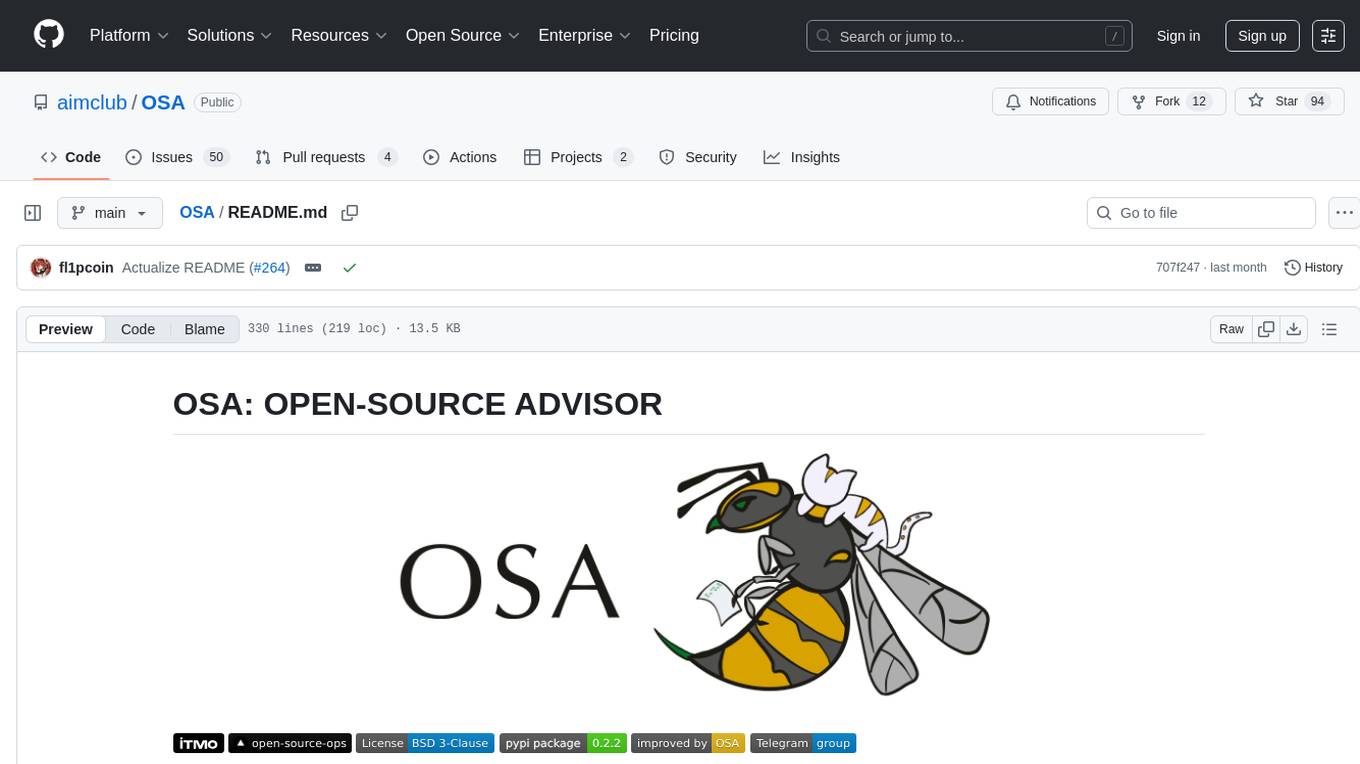
OSA
OSA (Open-Source-Advisor) is a tool designed to improve the quality of scientific open source projects by automating the generation of README files, documentation, CI/CD scripts, and providing advice and recommendations for repositories. It supports various LLMs accessible via API, local servers, or osa_bot hosted on ITMO servers. OSA is currently under development with features like README file generation, documentation generation, automatic implementation of changes, LLM integration, and GitHub Action Workflow generation. It requires Python 3.10 or higher and tokens for GitHub/GitLab/Gitverse and LLM API key. Users can install OSA using PyPi or build from source, and run it using CLI commands or Docker containers.
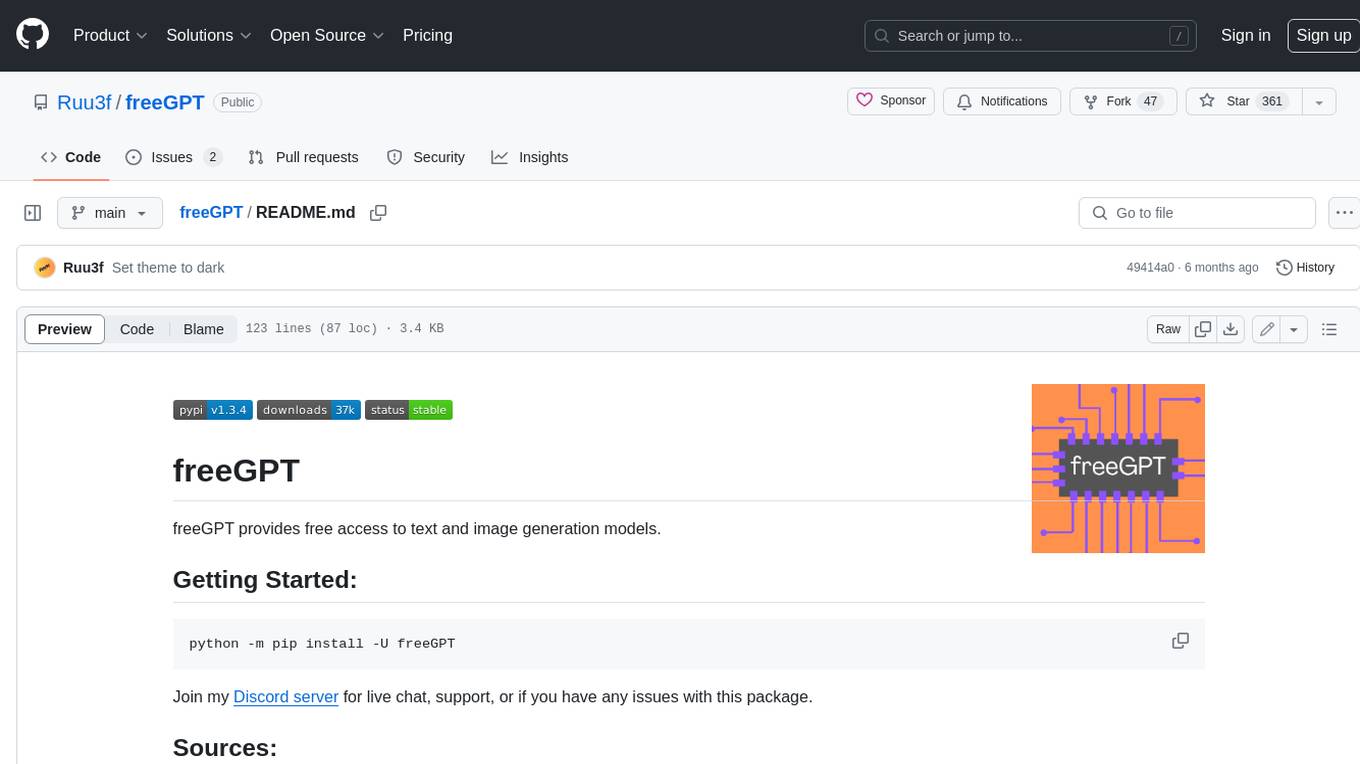
freeGPT
freeGPT provides free access to text and image generation models. It supports various models, including gpt3, gpt4, alpaca_7b, falcon_40b, prodia, and pollinations. The tool offers both asynchronous and non-asynchronous interfaces for text completion and image generation. It also features an interactive Discord bot that provides access to all the models in the repository. The tool is easy to use and can be integrated into various applications.
For similar tasks

agentops
AgentOps is a toolkit for evaluating and developing robust and reliable AI agents. It provides benchmarks, observability, and replay analytics to help developers build better agents. AgentOps is open beta and can be signed up for here. Key features of AgentOps include: - Session replays in 3 lines of code: Initialize the AgentOps client and automatically get analytics on every LLM call. - Time travel debugging: (coming soon!) - Agent Arena: (coming soon!) - Callback handlers: AgentOps works seamlessly with applications built using Langchain and LlamaIndex.
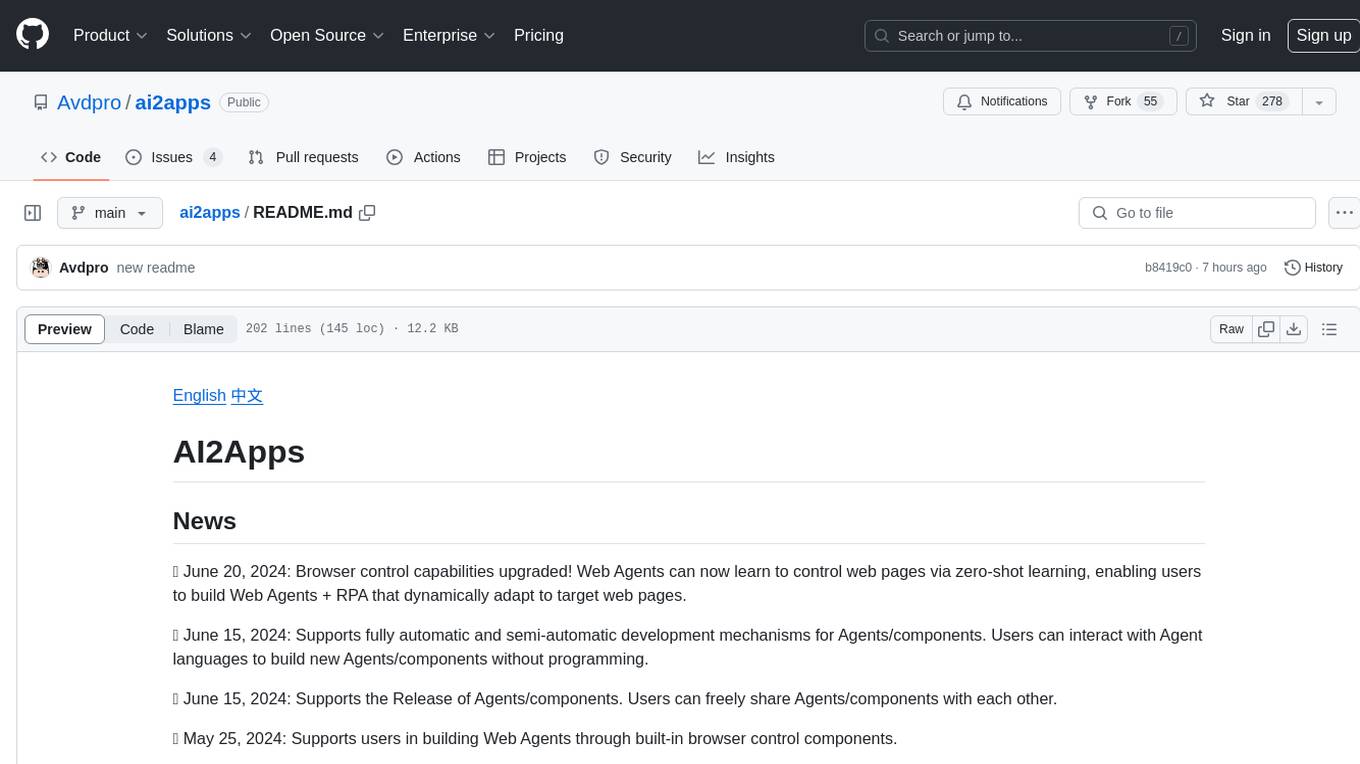
ai2apps
AI2Apps is a visual IDE for building LLM-based AI agent applications, enabling developers to efficiently create AI agents through drag-and-drop, with features like design-to-development for rapid prototyping, direct packaging of agents into apps, powerful debugging capabilities, enhanced user interaction, efficient team collaboration, flexible deployment, multilingual support, simplified product maintenance, and extensibility through plugins.

connectonion
ConnectOnion is a simple, elegant open-source framework for production-ready AI agents. It provides a platform for creating and using AI agents with a focus on simplicity and efficiency. The framework allows users to easily add tools, debug agents, make them production-ready, and enable multi-agent capabilities. ConnectOnion offers a simple API, is production-ready with battle-tested models, and is open-source under the MIT license. It features a plugin system for adding reflection and reasoning capabilities, interactive debugging for easy troubleshooting, and no boilerplate code for seamless scaling from prototypes to production systems.
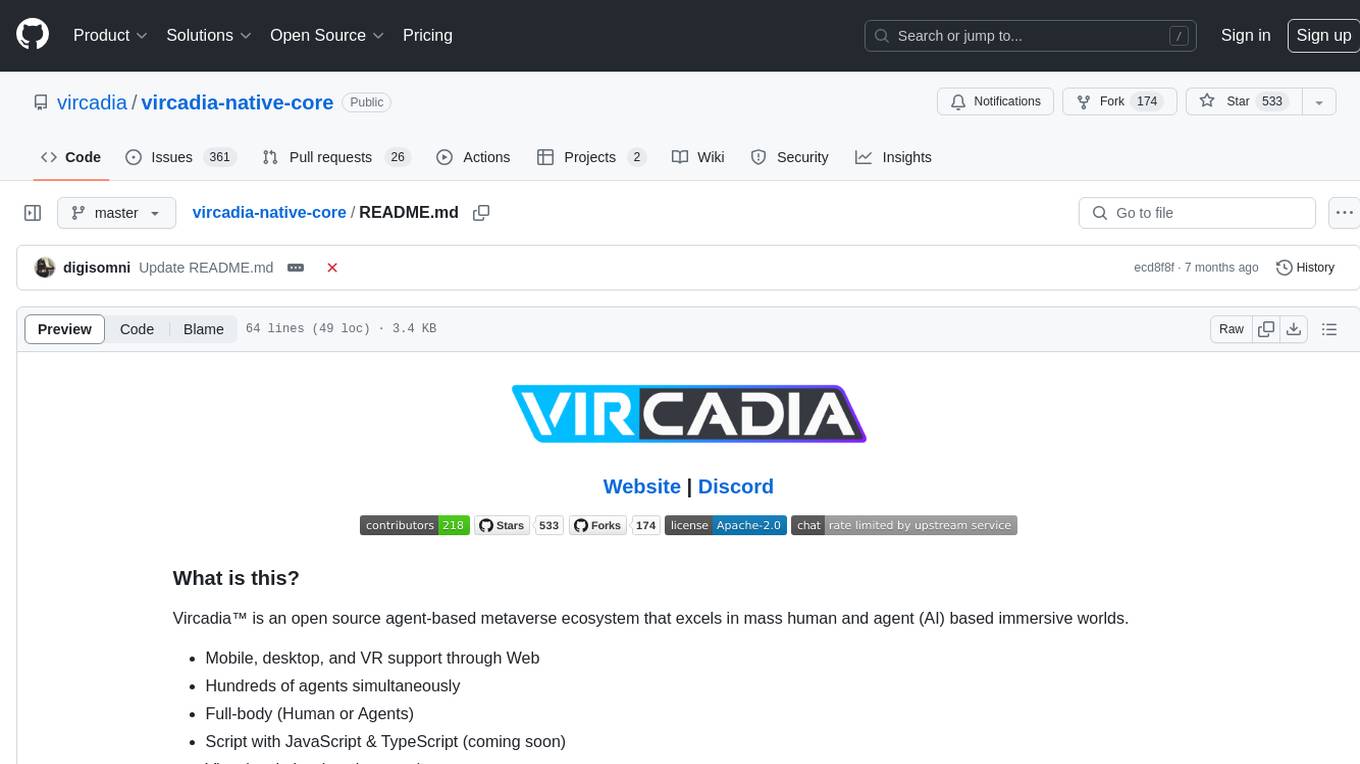
vircadia-native-core
Vircadia™ is an open source agent-based metaverse ecosystem that excels in mass human and agent (AI) based immersive worlds. It offers mobile, desktop, and VR support through the web, allows hundreds of agents simultaneously, supports full-body (human or agents), scripting with JavaScript & TypeScript, visual scripting, full world editor, 4096km³ world space in a server, fully self-hosted, and more. Vircadia is sponsored by various companies, organizations, and governments. An 'agent' in Vircadia is an AI being that shares the same space as users, interacting, speaking, and experiencing the world, used for companionship, training, and gameplay opportunities. Vircadia excels at deploying agents en-masse for a full sandbox experience.
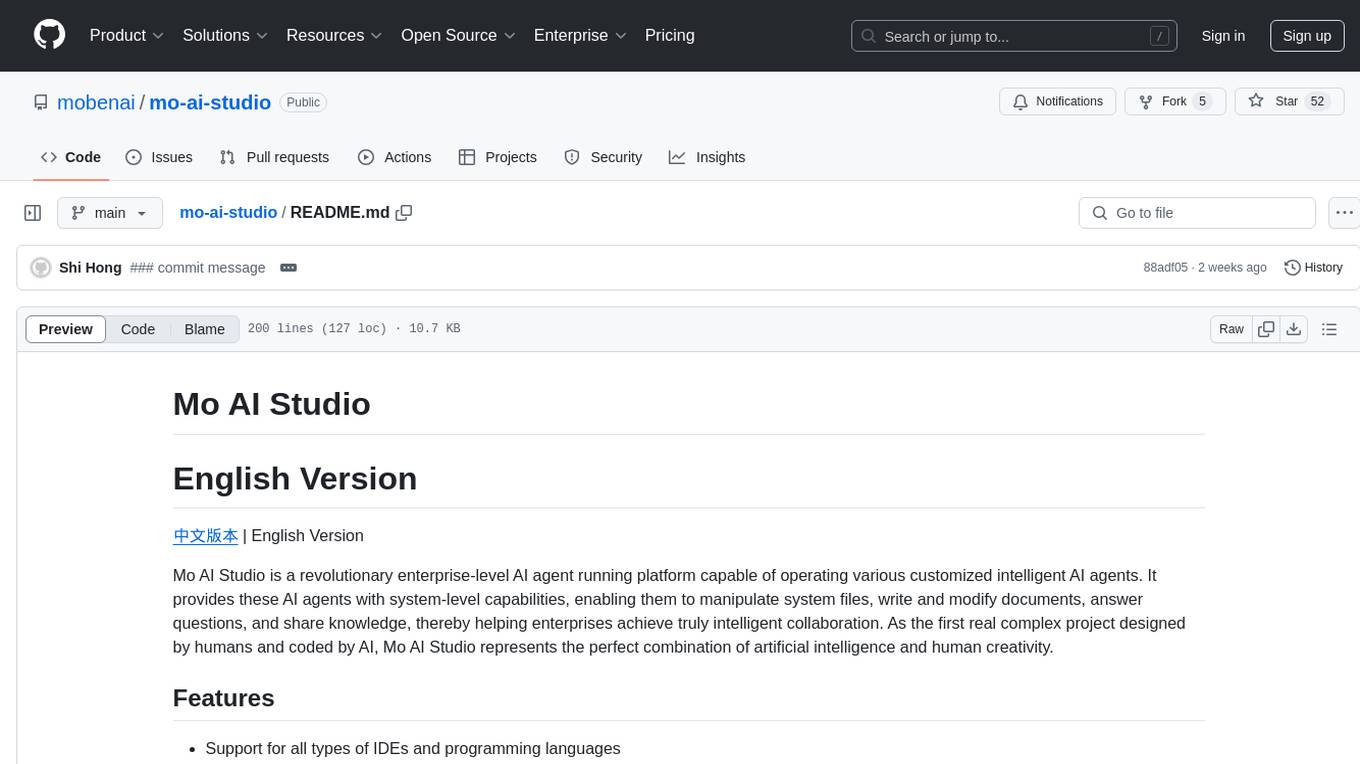
mo-ai-studio
Mo AI Studio is an enterprise-level AI agent running platform that enables the operation of customized intelligent AI agents with system-level capabilities. It supports various IDEs and programming languages, allows modification of multiple files with reasoning, cross-project context modifications, customizable agents, system-level file operations, document writing, question answering, knowledge sharing, and flexible output processors. The platform also offers various setters and a custom component publishing feature. Mo AI Studio is a fusion of artificial intelligence and human creativity, designed to bring unprecedented efficiency and innovation to enterprises.
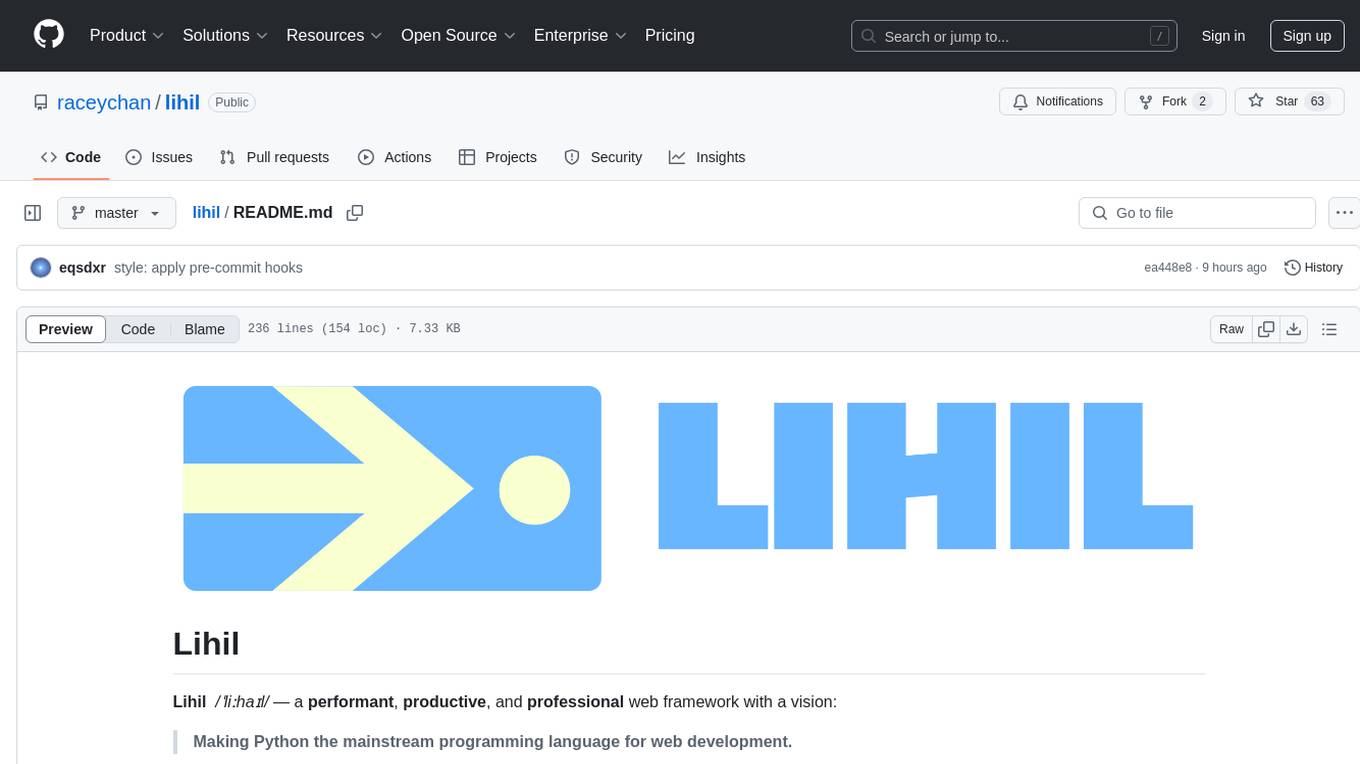
lihil
Lihil is a performant, productive, and professional web framework designed to make Python the mainstream programming language for web development. It is 100% test covered and strictly typed, offering fast performance, ergonomic API, and built-in solutions for common problems. Lihil is suitable for enterprise web development, delivering robust and scalable solutions with best practices in microservice architecture and related patterns. It features dependency injection, OpenAPI docs generation, error response generation, data validation, message system, testability, and strong support for AI features. Lihil is ASGI compatible and uses starlette as its ASGI toolkit, ensuring compatibility with starlette classes and middlewares. The framework follows semantic versioning and has a roadmap for future enhancements and features.
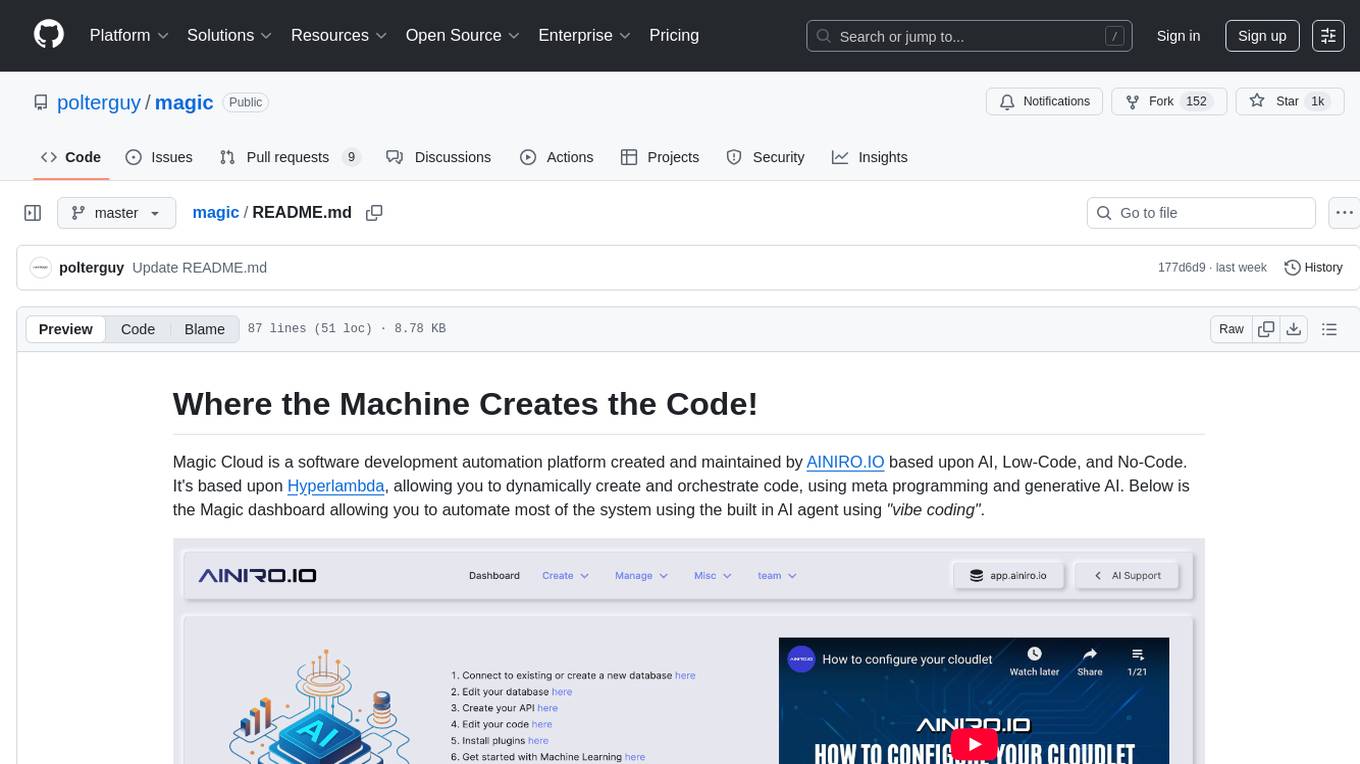
magic
Magic Cloud is a software development automation platform based on AI, Low-Code, and No-Code. It allows dynamic code creation and orchestration using Hyperlambda, generative AI, and meta programming. The platform includes features like CRUD generation, No-Code AI, Hyperlambda programming language, AI agents creation, and various components for software development. Magic is suitable for backend development, AI-related tasks, and creating AI chatbots. It offers high-level programming capabilities, productivity gains, and reduced technical debt.
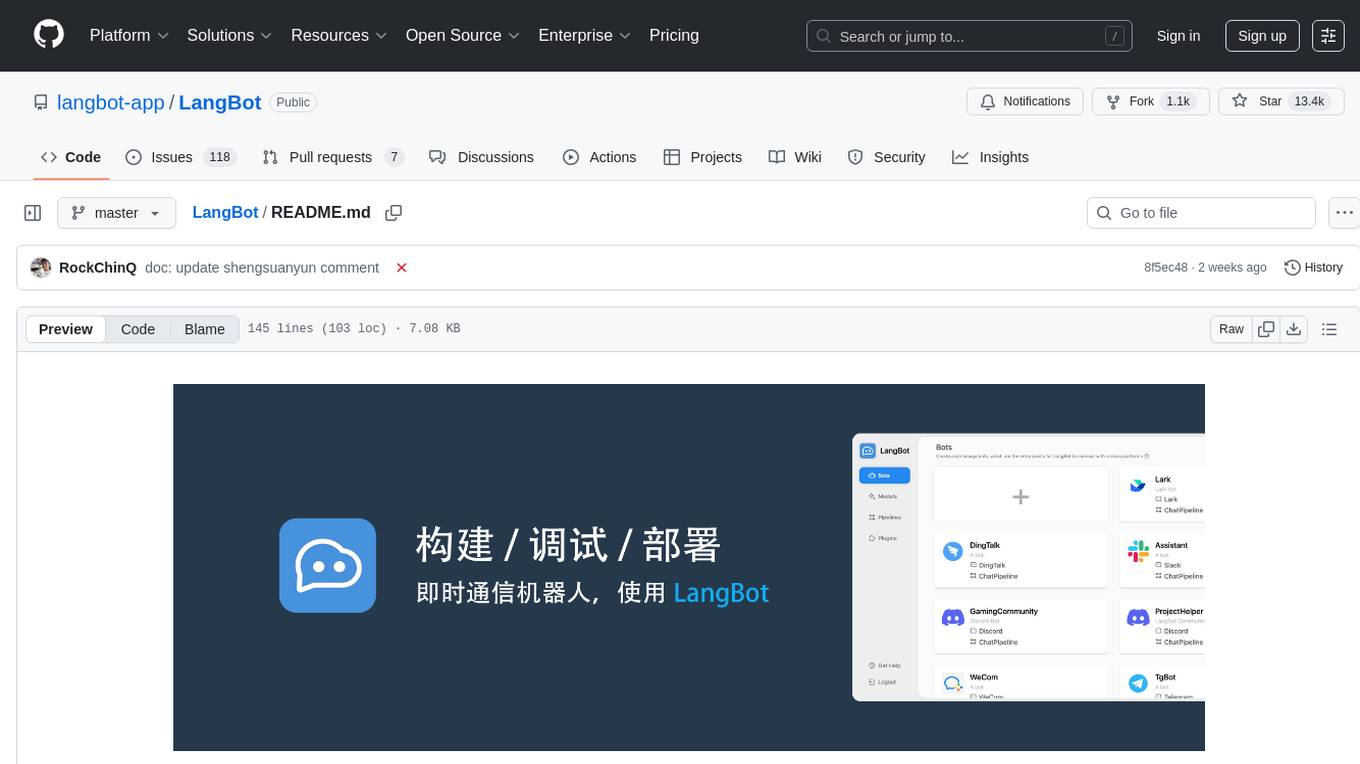
LangBot
LangBot is an open-source large language model native instant messaging robot development platform, aiming to provide a plug-and-play IM robot development experience, with various LLM application functions such as Agent, RAG, MCP, adapting to mainstream instant messaging platforms globally, and providing rich API interfaces to support custom development.
For similar jobs

weave
Weave is a toolkit for developing Generative AI applications, built by Weights & Biases. With Weave, you can log and debug language model inputs, outputs, and traces; build rigorous, apples-to-apples evaluations for language model use cases; and organize all the information generated across the LLM workflow, from experimentation to evaluations to production. Weave aims to bring rigor, best-practices, and composability to the inherently experimental process of developing Generative AI software, without introducing cognitive overhead.

LLMStack
LLMStack is a no-code platform for building generative AI agents, workflows, and chatbots. It allows users to connect their own data, internal tools, and GPT-powered models without any coding experience. LLMStack can be deployed to the cloud or on-premise and can be accessed via HTTP API or triggered from Slack or Discord.

VisionCraft
The VisionCraft API is a free API for using over 100 different AI models. From images to sound.

kaito
Kaito is an operator that automates the AI/ML inference model deployment in a Kubernetes cluster. It manages large model files using container images, avoids tuning deployment parameters to fit GPU hardware by providing preset configurations, auto-provisions GPU nodes based on model requirements, and hosts large model images in the public Microsoft Container Registry (MCR) if the license allows. Using Kaito, the workflow of onboarding large AI inference models in Kubernetes is largely simplified.

PyRIT
PyRIT is an open access automation framework designed to empower security professionals and ML engineers to red team foundation models and their applications. It automates AI Red Teaming tasks to allow operators to focus on more complicated and time-consuming tasks and can also identify security harms such as misuse (e.g., malware generation, jailbreaking), and privacy harms (e.g., identity theft). The goal is to allow researchers to have a baseline of how well their model and entire inference pipeline is doing against different harm categories and to be able to compare that baseline to future iterations of their model. This allows them to have empirical data on how well their model is doing today, and detect any degradation of performance based on future improvements.

tabby
Tabby is a self-hosted AI coding assistant, offering an open-source and on-premises alternative to GitHub Copilot. It boasts several key features: * Self-contained, with no need for a DBMS or cloud service. * OpenAPI interface, easy to integrate with existing infrastructure (e.g Cloud IDE). * Supports consumer-grade GPUs.

spear
SPEAR (Simulator for Photorealistic Embodied AI Research) is a powerful tool for training embodied agents. It features 300 unique virtual indoor environments with 2,566 unique rooms and 17,234 unique objects that can be manipulated individually. Each environment is designed by a professional artist and features detailed geometry, photorealistic materials, and a unique floor plan and object layout. SPEAR is implemented as Unreal Engine assets and provides an OpenAI Gym interface for interacting with the environments via Python.

Magick
Magick is a groundbreaking visual AIDE (Artificial Intelligence Development Environment) for no-code data pipelines and multimodal agents. Magick can connect to other services and comes with nodes and templates well-suited for intelligent agents, chatbots, complex reasoning systems and realistic characters.
















